


High-volume hiring refers to the process of rapidly recruiting large numbers of employees or managing a high influx of applications for specific roles. According to Aptitude Research, 65% of companies report facing high-volume hiring demands, defined as either filling over 25 positions in a short timeframe. This challenge is particularly prominent in retail, technology, and healthcare industries, where the need to scale the workforce quickly is critical.
According to Robert Walters‘ latest index, global hiring activity experienced a notable uptick in October, with job vacancies for professional roles rising by 9% month-on-month. While the October increase follows a 5% decline in September, a year-over-year comparison reveals a more nuanced perspective. Despite the recent surge, overall hiring remains 2% lower compared to last year’s period, reflecting broader economic uncertainties and sector-specific fluctuations.
Regionally, the United States and Britain saw month-on-month gains of 11% and 4%, respectively. However, on a year-over-year basis, these markets exhibit mixed results: the US shows a 3% decline, while Britain remains flat. Conversely, Canada and Mexico recorded significant 18% and 22% month-on-month increases, driven by companies seeking proximity to US clients amidst ongoing geopolitical shifts and trade renegotiations. According to Robert Walters’ CEO, Toby Fowlston, this upward trend in North America could intensify in the next quarter.
However, rapid job openings have created challenges in managing large applicant pools effectively. As hiring demands escalate, businesses increasingly turn to automation, AI-driven screening, and data-driven strategies to streamline high-volume recruitment without compromising candidate quality. This approach addresses immediate recruitment needs and mitigates the impact of fluctuating hiring trends by enabling more agile and targeted sourcing strategies.
High-volume hiring is the process of recruiting many employees within a short timeframe.
It is common in industries with high employee turnover, such as retail, hospitality, and logistics, where companies must fill multiple positions quickly, often for seasonal demand, business expansion, or urgent project needs.
Unlike traditional hiring, high-volume recruiting needs automation, structured processes, and data-driven strategies to screen and onboard candidates effectively. Managing high applicant volumes can become overwhelming and costly without a well-planned approach.
Do you have IT recruitment needs?
Regular recruitment targets one position at a time, using job ads, interviews, and assessments to select a single candidate. The process is manual, time-intensive, and tailored to specific roles. High-volume hiring scales up the recruitment process to simultaneously handle hundreds or thousands of applicants. This approach relies on automation, AI-driven tools, and applicant tracking systems (ATS) to screen resumes, conduct interviews, and manage candidate selection at scale. Mass hiring is especially effective for entry-level roles that require multiple hires with similar qualifications.
High-volume recruiting demands a structured, technology-driven approach to manage large volumes of applications efficiently. Unlike traditional hiring, where recruiters typically focus on one role at a time, mass hiring involves sourcing, screening, and selecting multiple candidates simultaneously. Without a streamlined process, recruiters can quickly become overwhelmed, leading to delays, poor candidate experiences, and rushed decisions.
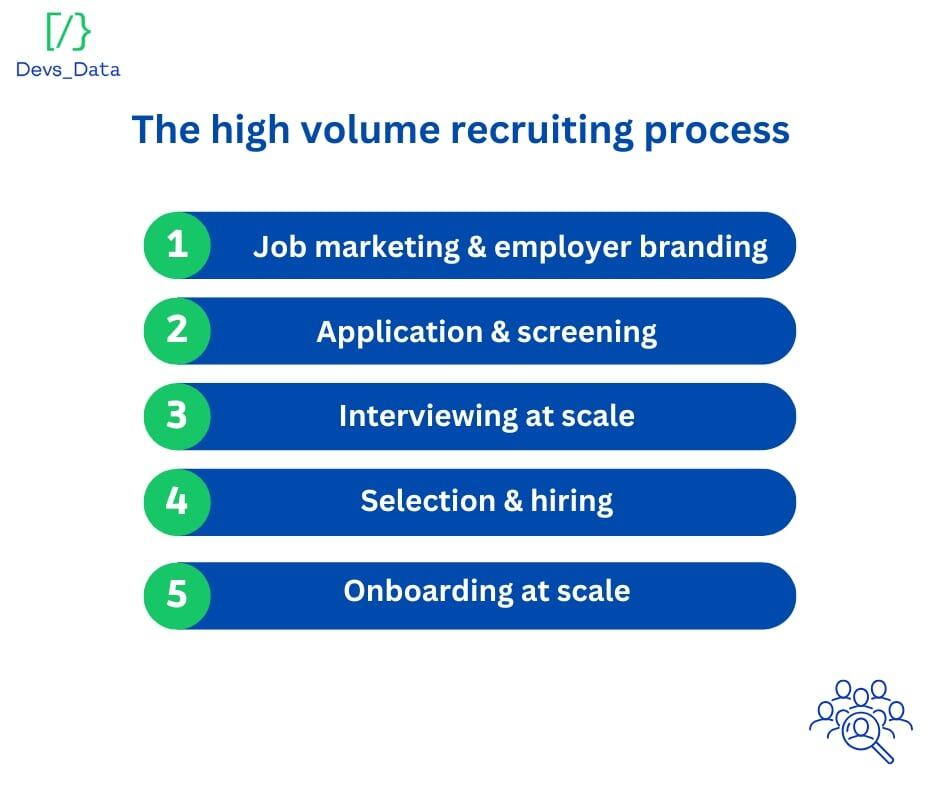
Effective job marketing and strong employer branding are essential to attract top talent at scale. In the case of a global fashion corporation undergoing digital transformation, DevsData LLC supported its hiring campaign by highlighting its ambitious $9 million innovation lab investment and cutting-edge project goals to attract top-tier candidates. The clear vision of transformation and impact helped generate strong interest from skilled professionals across North America and Europe.
Manually reviewing thousands of applications wasn’t feasible for this project. DevsData LLC implemented a multi-layered vetting pipeline that included:
This structure ensured consistency and quality across a large candidate pool, with an approval rate below 4%, allowing only the best to advance.
To evaluate specialists from diverse regions, including the US, Canada, Germany, and Sweden, DevsData LLC relied on remote interviewing tools and structured technical interviews. The standardized format allowed engineers and business leads to assess both technical capabilities and domain relevance efficiently across time zones, reducing time-to-hire and ensuring cultural fit for a multi-department digital transformation team.
Data-driven hiring decisions were crucial. DevsData LLC successfully assembled the core teams in Machine Learning, UX/UI, Software Development, and Operations using a combination of technical scores, cultural fit evaluations, and business alignment checks. The hires included relocated specialists from London and North America, tailored to meet the project’s international scope and complexity.
Once hired, the teams were seamlessly onboarded into the innovation lab initiative. DevsData LLC collaborated with the client to ensure access to internal documentation, architecture guidelines, and business processes. Within the first year, these teams delivered several mission-critical IT systems, including:
These solutions played a key role in reshaping operations, marketing, and logistics, helping the company reestablish competitive advantage in a saturated market.
This real-world example demonstrates how structured, high-volume recruiting can drive successful digital transformation when paired with strategic planning and technical rigor. The fashion company’s success illustrates what’s possible when recruitment is treated as a critical business function rather than a back-office task.
High-volume hiring requires a well-structured, data-driven approach to ensure efficiency while preserving candidate quality. Companies may experience overwhelmed recruiters, high candidate drop-off rates, and poor retention without the correct techniques. Success lies in utilizing automation, enhancing recruitment marketing, and delivering a seamless candidate experience.
Manually screening thousands of resumes and scheduling interviews is impractical. Applicant Tracking Systems (ATS) streamline this process by parsing resumes and ranking candidates based on relevance, reducing recruiter workload by up to 40% in some cases, such as a healthcare provider hiring 200 nurses over three months. AI chatbots further enhance communication, conducting pre-screening assessments and scheduling interviews, allowing recruiters to focus on high-value tasks.
Effective job advertising is essential for attracting large numbers of candidates quickly. Programmatic job advertising uses AI to place job ads strategically across platforms, optimizing reach and budget. For example, a logistics firm hiring 100 warehouse staff reduced ad spend by 15% while increasing qualified applicants by 30% through targeted programmatic ads.
A well-maintained talent pipeline reduces the need for new sourcing efforts every hiring cycle. Talent rediscovery tools integrated into ATS platforms help companies re-engage past applicants. A tech startup filling software roles quickly reconnected with previous candidates, filling 4 out of 10 positions in just two weeks.
A poor candidate experience can lead to high drop-off rates. Engaging candidates with timely updates and clear communication is crucial. For instance, a retail chain hiring 700 seasonal workers used SMS notifications to keep applicants informed, reducing drop-off rates by 20%.
Employer branding is crucial for attracting and retaining high-quality candidates. Companies that effectively showcase their culture, values, and work environment in a competitive job market gain an edge in attracting top talent.
A strong social media presence helps communicate what working for the company is like. Sharing employee testimonials, workplace videos, and behind-the-scenes content makes an organization more relatable. Reviews on platforms like Glassdoor also impact a candidate’s decision-making process, so companies should actively manage and respond to employee feedback.
Fast hiring means little if new employees leave soon after starting. High turnover in high-volume hiring environments is a common challenge, often stemming from poor onboarding, unclear role expectations, and limited engagement during the first few weeks. A structured onboarding program helps mitigate these risks and enhances employee retention.
New recruits can utilize digital onboarding solutions to complete paperwork more efficiently, minimizing administrative burdens on their first day. Interactive training modules introduce employees to company expectations and job responsibilities. Regular check-ins and mentorship programs provide support during the early stages, increasing engagement and job satisfaction.
Data is at the core of successful high-volume recruiting. Companies that track and analyze key recruitment metrics, such as conversion rates, time to hire, and cost per hire, can make informed decisions to improve their process.
A/B testing job descriptions helps identify what attracts the best candidates. Tracking drop-off points in the hiring funnel highlights where candidates are disengaging, allowing companies to refine their approach. AI-powered analytics can predict which sourcing channels deliver the highest-quality hires, ensuring resources are allocated effectively.
Choosing the right high-volume agency is crucial for businesses requiring rapid, large-scale hiring without compromising quality.
Do you have IT recruitment needs?
The ideal agency should have a proven ability to source, screen, and onboard talent efficiently while maintaining compliance with industry standards.
A strong global network, advanced recruitment technology, and a track record of handling bulk hiring in various industries should be top considerations. Additionally, an agency’s ability to adapt to fluctuating workforce demands ensures long-term scalability.
In the following sections, we will examine leading high-volume recruitment agencies, evaluate their distinct capabilities, and demonstrate how they can assist your company in expanding its workforce. Whether you need seasonal staff, customer support teams, or large-scale technical hires, these agencies offer tailored solutions to meet your needs in today’s fast-moving business environment.
Here are our top picks:
Website: www.devsdata.com
Company size: ~60 employees
Founding year: 2016
Headquarters: Brooklyn, NY, and Warsaw, Poland
Finding a reliable partner for high-volume recruiting is essential for businesses scaling rapidly. DevsData LLC is a government-licensed recruitment agency with over 8 years of experience, specializing in sourcing top-tier talent at scale. Their expertise ensures a fast, data-driven hiring process designed to meet the demands of fast-growing enterprises.
With a global reach across the US, Europe, Latin America, and beyond, DevsData LLC has built a database of over 65000 pre-vetted candidates. While these candidates may not be actively seeking jobs, DevsData LLC can recruit them efficiently, significantly reducing the time needed to find suitable candidates for large-scale hiring. Their industry-leading screening includes a 90-minute problem-solving test designed by Google-level specialists, with only 6% of applicants meeting their high standards, ensuring businesses receive only the most qualified professionals.
DevsData LLC’s commitment to efficiency and quality extends beyond recruitment. Their high-volume hiring solutions incorporate streamlined processes, including tailored workforce planning, automated candidate pipelines, and scalable talent acquisition strategies. Leveraging AI-driven recruitment tools, data-driven assessments, and structured workflows minimizes inefficiencies, ensuring faster, more accurate candidate placements.
While the success fee model and guarantee period are typically applied to standard recruitment projects, clarifying whether these benefits extend to large-scale hiring scenarios, such as recruiting 100 candidates simultaneously, is worth explaining. Confirming this could provide additional confidence to potential clients considering DevsData LLC for extensive staffing needs.
DevsData provides Employer of Record (EoR) services, managing payroll, HR, and legal compliance with regional employment laws. For companies seeking talent, IT consulting, or managed services, DevsData LLC offers expertise in AI, machine learning, and software development, making them a strategic partner for large-scale workforce expansion. Their commitment to excellence is reflected in a stellar 5/5 client satisfaction rating on Clutch and GoodFirms, highlighting their ability to deliver top-tier talent and exceptional service consistently.
DevsData LLC partners with organizations across industries each year to meet complex technical hiring demands. One of the most distinctive examples is our collaboration with ZIM Integrated Shipping Services LTD, an Israel-based global container shipping company known for pioneering algorithm-driven logistics.
DevsData LLC assembled a dedicated team of recruiters and launched a rapid multi-channel search across 10+ European countries, sourcing from our proprietary database of 65000+ vetted engineers. Within three business days, we began delivering highly curated shortlists.
Candidates went through a rigorous five-step process, including behavioral interviews, live coding sessions, and deep technical evaluations. In under four months, we successfully filled 7 roles, including backend developers, data scientists, and full stack engineers.
Thanks to our speed and precision, ZIM improved product delivery timelines and cross-functional collaboration. Over three years, this evolved into a long-term partnership with 21 hires placed, making DevsData LLC their trusted recruitment partner for strategic talent acquisition.
Do you have IT recruitment needs?
For more information, contact DevsData LLC at general@devsdata.com or visit www.devsdata.com.
Key features:
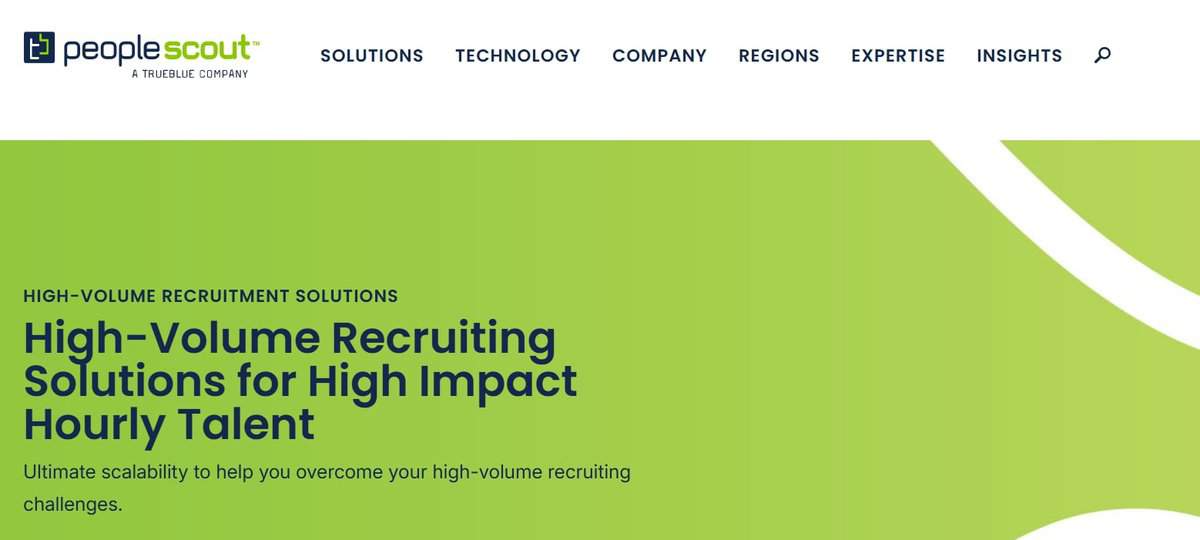
Website: peoplescout.com
Company size: ~5000 employees
Founding year: 1992
Headquarters: Sydney, Australia
PeopleScout is a leader in enterprise-level, high-volume hiring. It helps businesses scale quickly with AI-driven, data-backed recruitment solutions. Whether handling seasonal surges, large-scale expansions, or frontline personnel, PeopleScout guarantees that organizations secure excellent people rapidly.
With over 30 years of expertise in RPO (Recruitment Process Outsourcing), PeopleScout helps enterprises scale without compromising hiring quality. At the core of its high-volume recruiting approach is Affinix™, a cloud-based talent acquisition suite that leverages AI, machine learning, and predictive analytics to streamline sourcing, engagement, and hiring. Automated screening, scheduling, and digital interviews reduce hiring time, while AI-powered sourcing expands candidate reach. The mobile-friendly Affinix Quick Apply feature simplifies applications, minimizing drop-off rates.
Beyond efficiency, PeopleScout enhances employer branding with custom career sites and branded engagement tools, ensuring a smooth candidate experience. Advanced analytics provide deep insights into hiring performance, helping companies refine strategies and make data-driven decisions.
Key features:
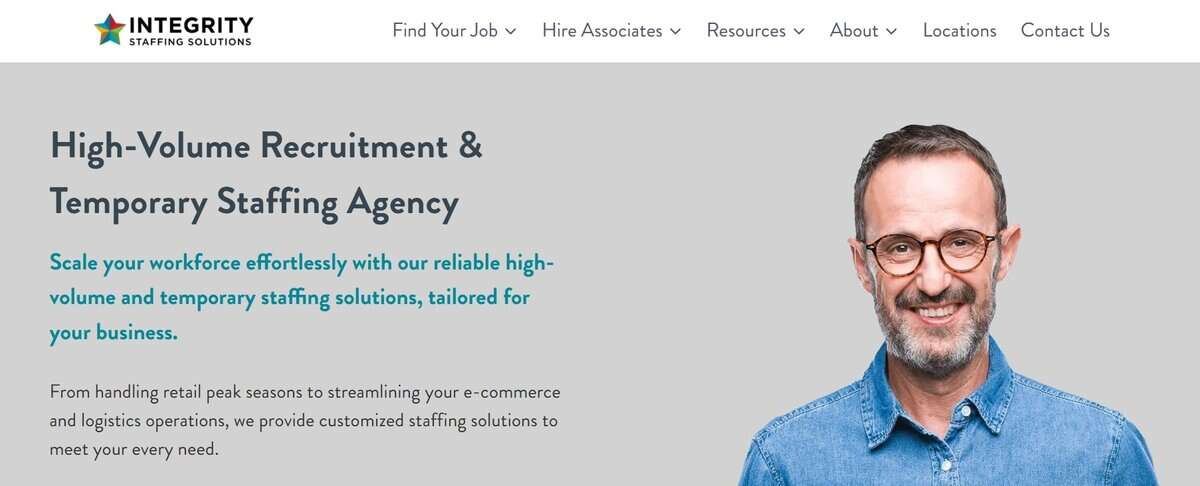
Website: integritystaffing.com
Company size: ~500 employees
Founding year: 1997
Headquarters: Newark, Delaware
With over 25 years of experience, Integrity Staffing Solutions delivers flexible, data-driven staffing solutions that help businesses fill roles quickly and keep operations running smoothly. Their services include temp-to-hire, direct hire, and large-scale workforce solutions, enabling companies to adapt swiftly to market changes.
Integrity Staffing leverages AI-powered candidate screening to streamline high-volume hiring, ensuring faster and more accurate matches. Their Managed Service Provider (MSP) option consolidates vendor management under a single system, simplifying staffing operations. Additionally, their onsite support teams enhance workforce engagement through shift managers, performance coaches, and HR specialists, fostering productivity and retention. Their centralized recruitment and data-driven approach provide real-time workforce insights, enabling better decision-making.
Key features:

Website: icims.com
Company size: ~5000 employees
Founding year: 2003
Headquarters: Hyderabad, India
iCims powers scalable talent acquisition, providing organizations with the tools to manage high-volume hiring without overwhelming HR teams efficiently. Its Talent Cloud automates sourcing, engaging, and onboarding candidates, ensuring a fast, smooth, and brand-aligned recruitment experience even during seasonal hiring spikes or sudden demand surges.
The platform is specifically designed to handle large applicant volumes effectively. AI-driven insights help recruiters identify top talent faster, while automation reduces repetitive tasks, allowing HR teams to focus on strategic hiring decisions. Advanced analytics track hiring metrics, optimize workflows, and minimize bias, improving diversity and retention across all roles. Retail, healthcare, manufacturing, and finance industries rely on iCims to scale their hiring efforts, speed up recruitment, and maintain candidate quality. With integrations like ADP, Microsoft, and UKG, iCims ensures seamless data management and compatibility across existing systems. It is a comprehensive solution for businesses aiming to attract, hire, and retain top talent at scale.
Key features:
Do you have IT recruitment needs?
After reviewing the leading agencies, let’s explore another tier of promising service providers.
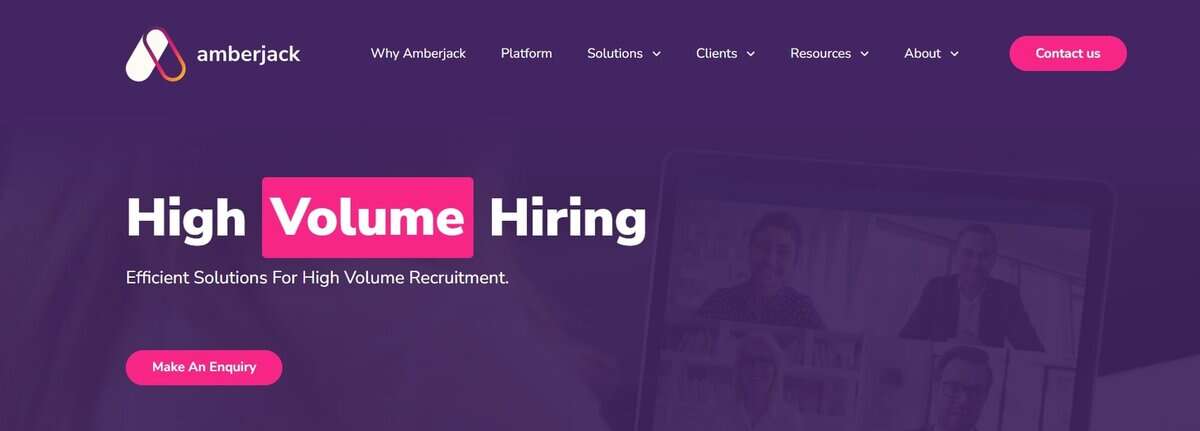
Website: weareamberjack.com
Company size: ~200 employees
Founding year: 2000
Headquarters: Newbury, UK
Amberjack specializes in quick, technology-driven, high-volume recruitment, helping organizations attract, assess, and hire top talent at scale. With expertise in labor market analytics, candidate engagement, and award-winning assessments, Amberjack streamlines hiring for even the most challenging roles. Their outsourcing services and candidate management technology ensure that businesses secure the right talent while improving the quality of hire and reducing turnover. With a data-driven and candidate-centric approach, Amberjack helps organizations improve hiring outcomes, improve candidate experience, and drive long-term workforce success.
To help organizations access and engage the right talent, Amberjack provides in-depth labor market reports, targeted attraction audits, and social media recruitment campaigns. Their partnership with Horsefly Analytics, a talent intelligence platform specializing in workforce data and labor market insights, enables data-driven talent pool identification, allowing businesses to connect with potential hires proactively. Amberjack’s blended online examinations combine situational judgment, cognitive, and behavioral evaluations into a seamless applicant experience. This approach ensures a fair and inclusive hiring process while reducing recruitment time and resource demands.
Key features:
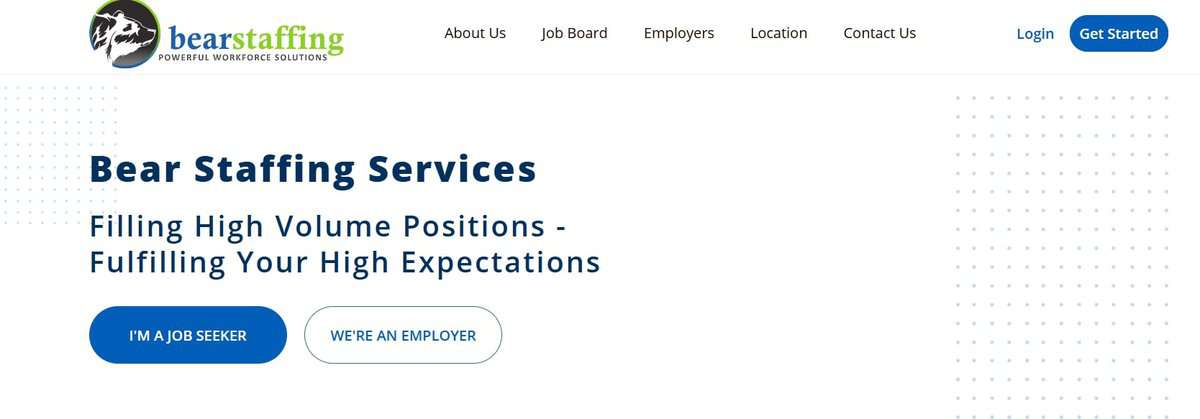
Website: bearstaff.com
Company size: ~500 employees
Founding year: 2005
Headquarters: Casselberry, Florida
Bear Staffing specializes in high-volume staffing for industries with high turnover, including manufacturing, distribution, call centers, and IT. Their Inverted Recruiting Model prioritizes candidate quality over quantity, focusing on thoroughly screening applicants before presenting them to clients. This approach and advanced recruitment technology enable them to fill thousands of roles quickly without compromising quality. Bear Staffing has earned a reputation for delivering skilled candidates at scale, with notable clients like Walmart, PepsiCo, and Harley-Davidson.
Their high-speed, tech-driven approach includes direct-hire staffing, recruitment process outsourcing (RPO), virtual recruitment, and on-site staffing, making them a trusted partner for companies facing workforce fluctuations and seasonal peaks. A robust team of staffing professionals ensures smooth hiring, while their rigorous screening process enhances candidate quality and retention.
Key features:
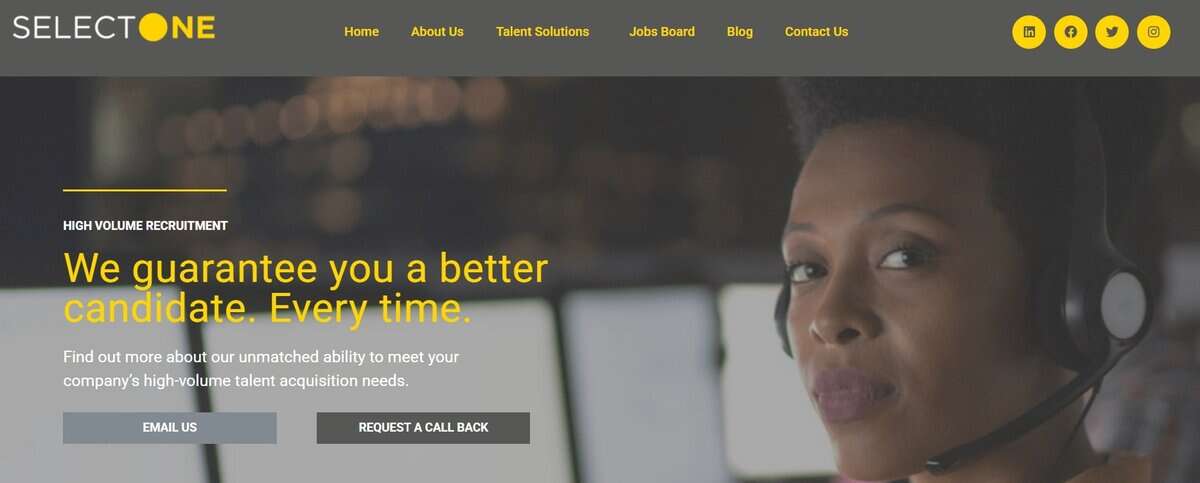
Website: selectone.co.za
Company size: ~50 employees
Founding year: 2017
Headquarters: Midrand, SA
SelectOne specializes in high-volume talent acquisition, delivering fast, personalized staffing solutions tailored to each company’s unique hiring needs. Unlike many competitors, SelectOne prioritizes cultural fit as a core component of its placement strategy. It uses AI-powered assessments to ensure candidates align with the role and the company’s values.
By leveraging predictive analytics and automation, SelectOne streamlines repetitive hiring tasks, allowing HR teams to focus on strategic initiatives. Their AI-driven assessments minimize bias, resulting in diverse and high-quality placements. With an extensive database of pre-screened candidates, they can fill roles in hours instead of weeks, reducing time-to-hire while improving retention. As a trusted talent solutions partner, SelectOne guarantees faster placements, lower turnover, and a seamless recruitment experience tailored for high-volume hiring needs.
Key features:
Large-volume recruiting presents unique challenges that can quickly overwhelm hiring teams if not managed effectively. The sheer scale of applications, the pressure to fill roles quickly, and the need to maintain candidate quality all contribute to a complex hiring landscape. Companies risk poor candidate experiences and high turnover rates without the right strategies and tools. Below are the most common challenges organizations face in high-volume hiring and how to overcome them.
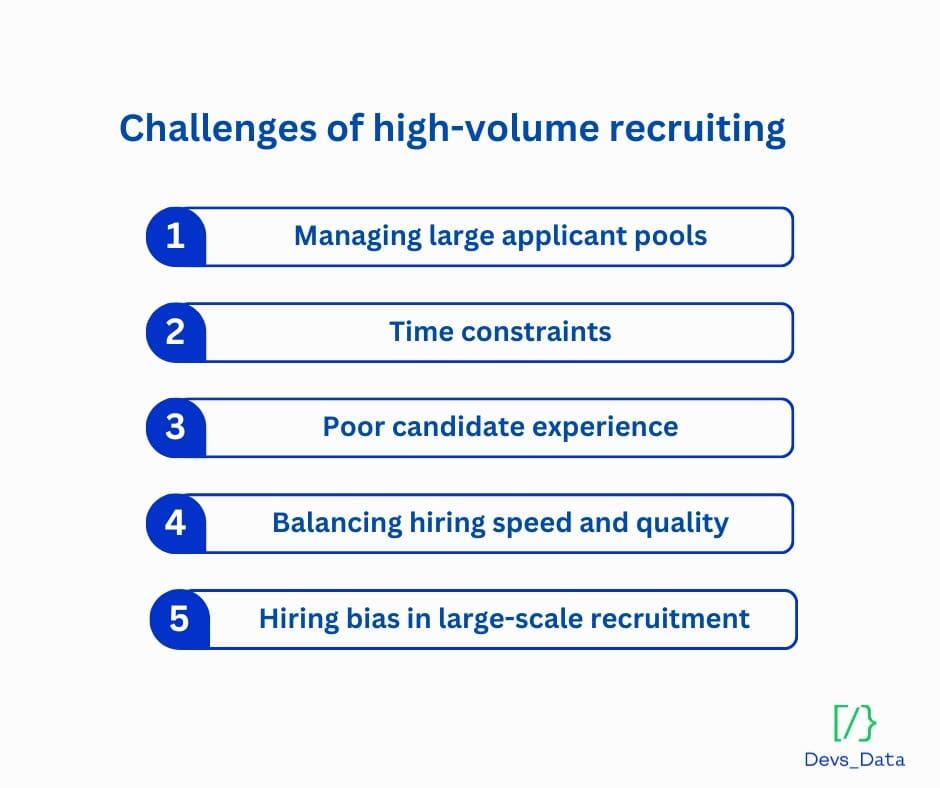
One of the biggest obstacles in high-volume recruiting is processing a flood of applications. A single job posting in a high-demand industry can generate hundreds or even thousands of resumes, making it impossible for recruiters to review each one manually. This leads to delayed responses, unstructured hiring decisions, and a backlog of unprocessed applications.
To manage this, companies rely on AI-driven Applicant Tracking Systems (ATS) that automate resume screening, rank candidates, and filter out unqualified applicants using keyword-matching technology and machine learning. Some ATS platforms include integrated AI-powered chatbots that handle initial interactions, answer common applicant questions, and schedule interviews. Alternatively, companies may use standalone chatbot tools to support the recruitment process. By reducing manual workload, recruiters can focus on engaging with the most promising candidates instead of sifting through a mountain of resumes.
High-volume hiring often comes with tight deadlines due to seasonal spikes, business expansion, or urgent staffing needs. Traditional recruitment methods are too slow to keep up, leading to lost talent or unmet business demands.
Companies leverage pre-built talent pools and data-driven hiring to accelerate recruitment without compromising quality. Maintaining a database of past applicants enables quick placements, while programmatic job ads adjust postings based on urgency, reaching the right candidates faster.
AI-powered scheduling tools reduce manual coordination, shortening interview timeframes. Furthermore, integrated pre-employment evaluations within ATS platforms analyze prospects immediately, decreasing screening time while maintaining hiring standards.
A rushed hiring process can frustrate candidates, leading to high drop-off rates and negative employer branding. Common pain points include lengthy application processes, inadequate communication, and unclear timelines. Candidates who feel ignored or left waiting are more likely to withdraw their applications or accept offers elsewhere.
Companies must prioritize transparency and responsiveness to improve the candidate experience. AI-powered chatbots provide instant answers to applicants’ questions and guide them through the process, ensuring they stay engaged. Automated updates via email or SMS keep candidates informed about their status, reducing uncertainty.
Another key factor is simplifying the application process. Long, repetitive forms discourage applicants, so using one-click applications and mobile-friendly interfaces can significantly boost completion rates. Companies can reduce candidate drop-offs and maintain a strong employer reputation by making the process fast, clear, and interactive.
A major risk in high-volume hiring is sacrificing candidate quality for speed. Companies often prioritize filling positions quickly, but later struggle with high turnover rates and underqualified hires. When recruiters are overwhelmed, they may make rushed decisions, leading to mismatches between candidates and job requirements.
Companies should utilize structured interviews, skills assessments, and data-driven evaluations to maintain quality during large-scale hiring.
Pre-employment testing can objectively assess technical skills, problem-solving abilities, behavioral traits, and cultural fit. AI-based assessments further predict job performance by analyzing candidate responses, reducing reliance on gut instinct.
Talent rediscovery also plays a key role. Instead of sourcing new candidates from scratch, companies can revisit past applicants stored in their ATS who previously applied for similar roles. Since these candidates have already shown interest, they often require less screening and can be hired more quickly while still meeting job criteria.
High-volume recruiting increases the risk of unconscious bias, as recruiters may rely on subjective judgments when quickly sorting through large applicant pools. Bias can occur in resume screening, interviews, and job descriptions, leading to less diverse hiring outcomes.
To ensure fair and objective hiring, companies should implement blind hiring techniques, removing identifying information (such as name, gender, or age) during initial screenings. AI-powered assessments further mitigate bias by evaluating candidates based on objective performance data. Using machine learning algorithms, these tools analyze skills, cognitive abilities, and behavioral responses, focusing on data patterns rather than subjective opinions.
Structured interviews, where every candidate is asked the same set of standardized questions, help minimize inconsistencies in evaluation. Additionally, AI-driven tools can identify potential bias in hiring patterns, flagging disparities in candidate selection, and providing data-driven recommendations for more equitable recruitment practices.
Tracking the right metrics is essential for making high-volume hiring efficient, cost-effective, and scalable. Without data, companies risk wasting resources, hiring underqualified candidates, or losing top talent to competitors. Organizations can improve their hiring process by measuring specific recruitment KPIs, reducing errors, and improving long-term workforce stability.
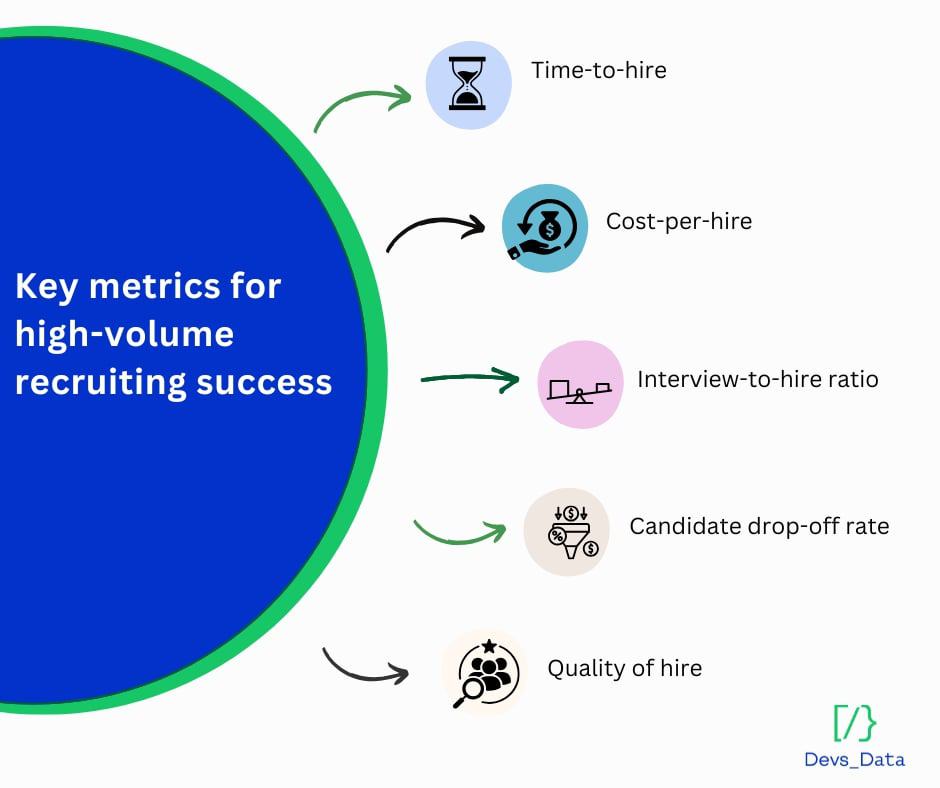
Time to hire measures the days between posting a job and a candidate accepting an offer. In high-volume hiring, delays can lead to losing top talent to faster-moving competitors. A slow process also impacts productivity, while rushing leads to poor hiring decisions. AI-driven screening, automated scheduling, and pre-built talent pools help reduce hiring time without compromising quality. Companies that maximize this metric fill roles faster and improve overall hiring efficiency.
The cost-per-hire includes job advertising, recruiter salaries, recruitment software, and onboarding expenses. High costs often signal inefficiencies, such as excessive advertising or high rejection rates. Companies can reduce these expenses by implementing automation to streamline repetitive tasks, targeted job advertisements to reach qualified candidates more effectively, and referral programs that lower sourcing costs. Improved recruitment procedures minimize unnecessary spending while maintaining a steady talent flow, reducing the overall cost-per-hire.
This metric indicates the number of interviews required before making a hire. A high ratio indicates ineffective screening, while a low ratio may mean poor candidate evaluation. Strengthening pre-screening, using structured assessments, and standardizing interview questions streamline selection. Improving this ratio saves recruiters time and ensures only the best candidates advance.
The candidate drop-off rate measures the number of applicants who abandon the hiring process before it is completed. Lengthy applications, slow responses, or unclear communication often cause candidates to leave. Simplifying applications, using AI chatbots for real-time updates, and automating follow-ups help keep candidates engaged. Reducing drop-off rates leads to a more substantial talent pipeline and a better candidate experience.
Quality of hire measures how well new employees perform and how long they stay. It’s assessed through KPIs, performance ratings, retention rates, and time to full productivity. Tracking these metrics through manager evaluations and feedback helps refine hiring criteria. Targeted onboarding and training also boost performance and retention, stabilizing the workforce.
Scaling high-volume recruitment requires balancing speed and candidate quality. Companies hiring at scale must streamline processes, leverage technology, and ensure long-term retention to prevent constant rehiring.
High-quality hiring can become costly and inefficient without a strategic approach, leading to high employee turnover.
The following best practices help organizations manage recruitment at scale while maintaining a strong talent pipeline.
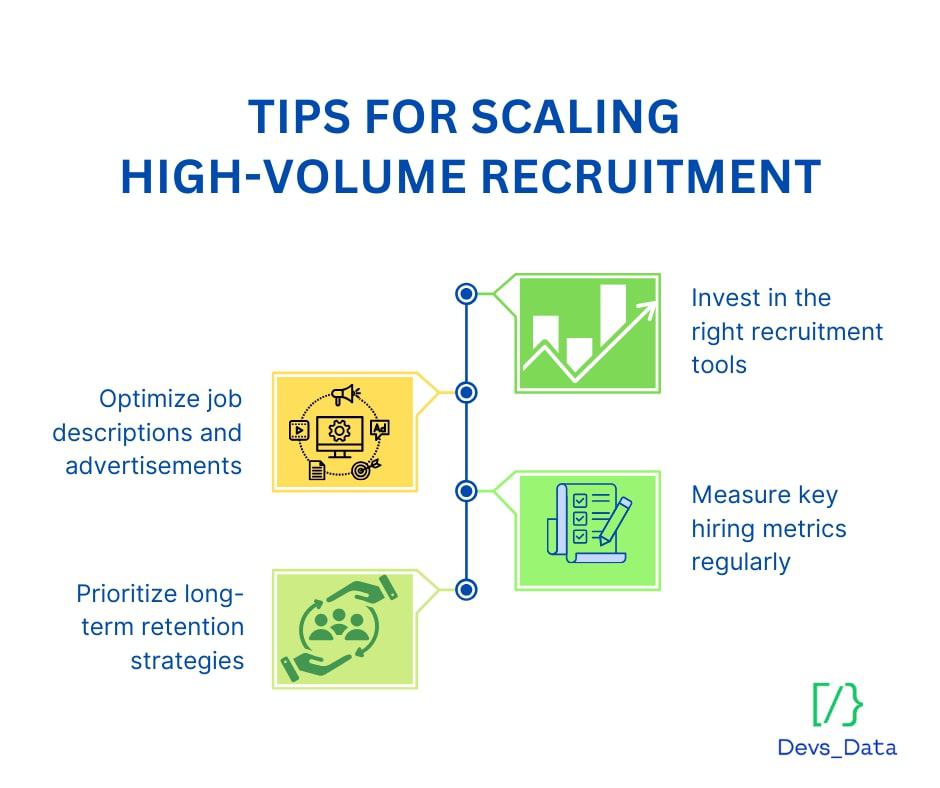
Technology is essential for handling large applicant pools. Applicant Tracking Systems (ATS) automate resume screening, ranking, and communication, reducing recruiter workload. AI-powered chatbots handle pre-screening, FAQs, and interview scheduling, keeping candidates engaged.
Programmatic job advertising ensures job postings reach the right candidates by adjusting performance-based placements. AI-driven analytics enable tracking hiring trends, measuring sourcing effectiveness, and refining recruitment strategies.
Well-crafted job descriptions attract qualified candidates, reducing recruiter workload. AI-driven programmatic ads target relevant platforms, maximizing reach cost-effectively. A mobile-friendly, streamlined application process with simplified forms and one-click resume uploads prevents candidate drop-offs.
Monitoring KPIs like time-to-hire, cost-per-hire, and drop-off rates identifies inefficiencies and refines recruitment strategies. Data-driven insights improve sourcing, boost engagement, and lower hiring costs.
Effective onboarding and career development opportunities promote long-term retention, minimizing rehiring costs. A strong employer brand, clear communication, and targeted incentives further enhance engagement and reduce turnover.
High-volume recruiting is no longer just an operational necessity—it’s a strategic imperative for businesses navigating rapid growth, seasonal demand, and evolving workforce challenges. Industries such as retail, healthcare, and technology are particularly affected, requiring agile, technology-driven solutions to meet the growing demand for skilled talent. As job vacancies continue to surge, companies increasingly turn to automation, AI-driven screening, and data-backed hiring strategies to maintain speed without sacrificing candidate quality.
Partnering with the right high-volume recruitment agency ensures a streamlined, scalable, and effective hiring process. DevsData LLC stands out as a leader in this space, offering a data-driven approach with a global reach and a pre-vetted candidate pool of over 65000 professionals. While these candidates may not be actively seeking jobs, DevsData LLC can recruit them efficiently, significantly reducing the time needed to find suitable candidates for large-scale hiring. Their rigorous screening process, AI-powered recruitment tools, and success fee model enable businesses to achieve both speed and quality. Additionally, their Employer of Record (EoR) services and expertise in IT consulting make them a comprehensive partner for companies looking to expand their workforce seamlessly.
With a proven track record of delivering high-quality talent, DevsData LLC has successfully helped organizations across industries scale efficiently, including a notable case study in the fashion sector that transformed a company’s digital operations. Their commitment to excellence is reflected in their industry-leading client satisfaction ratings, making them a trusted partner for businesses seeking top-tier talent. As workforce demands continue to evolve, high-volume hiring will remain a crucial factor in business success, and companies that adopt strategic, technology-driven approaches will be best positioned for long-term growth.
For more information, contact DevsData LLC at general@devsdata.com or visit www.devsdata.com.
Frequently asked questions (FAQ)
DevsData – your premium technology partner
DevsData is a boutique tech recruitment and software agency. Develop your software project with veteran engineers or scale up an in-house tech team of developers with relevant industry experience.
Free consultation with a software expert
🎧 Schedule a meeting
FEATURED IN


DevsData LLC is truly exceptional – their backend developers are some of the best I’ve ever worked with.”
Nicholas Johnson
Mentor at YC, serial entrepreneur


 Build your project with our veteran developers
Build your project with our veteran developers
 Explore the benefits of technology recruitment and tailor-made software
Explore the benefits of technology recruitment and tailor-made software
 Learn how to source skilled and experienced software developers
Learn how to source skilled and experienced software developers




Categories: Big data, data analytics | Software and technology | IT recruitment blog | IT in Poland | Content hub (blog)
